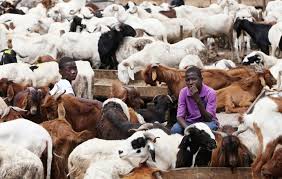By Emma Ogbuehi
Against the trend in the past, traders are lamenting low sales as Muslim faithful mark this year’s Eid-el Kabir festivities. The celebration symbolizes the willingness of Ibrahim (Abraham) to sacrifice his son, Ismael as an act of obedience to God’s command. But, before Ibrahim could make the sacrifice with his son, God provided a lamb, instead. In commemoration of this intervention, an animal, usually a Ram, is sacrificed ritually by the faithful. The meat is in parts, shared to the poor, friends and relations. Well-to-do Muslims also go on pilgrimage to Mecca at this period. Among Nigerians, the celebration is regarded as the Big Sallah, apparently to signify the difference from the more soberly Eid-el Fitri that marks end of fasting period. The Big Sallah is marked by merriments. The government in recognizing the importance of the event, declared Thursday, July 30 and Friday 31, public holidays.
But faced with the downturn in economy and the ravaging Coronavirus (COVID-19), Nigerians are marking the occasion in low key. The mood of the moment is further reflected in the various religious leaders asking the faithful to observe the Eid prayers in their homes.
Traders are the worst hit by the adverse state of the economy. A visit by our Reporter to markets, saw many traders complaining of low patronage. At Alaba Rago, popular Ram Market on Lagos-Badagry Expressway, it was a tale of woes by ram dealers. “Oga, if na before, we for don sell all these big rams. Market no dey again. No money for our country again. People de fear Covid. Them no wan come out to buy market”, Musa Ibrahim, who said he has been in the business for over 20 years, complained.
His colleague, Umaru Ango, corroborated his story, adding that the high cost of the rams, may also have scared buyers. According to him, a medium-sized ram that used to go for N25,000-N30,000, currently sells at N40,000 and above.
Dealers on foodstuff are also bearing the heat. At FESTAC Second Gate Market, popularly called Agboju, patronage was low. By 12.00 pm, the tempo of activities in the otherwise bubbling market was yet to rise. Iya Suna, who deals of Salad ingredients, blamed the situation on poor state of the economy. According to her, with companies retrenching workers while some are closing shops, the people’s purchasing power has been severely affected, making them go for strictly items considered as basic necessities. Her neighbour, who simply introduced himself as Mr. Sunday, attributed the slow pace of activities in the markets to the uncertainties of COVID-19 leading to traders having specific days for going to the market, according to the wares they deal on.
Lagos State Government had in a bid to minimize crowding in the markets, assigned Tuesdays, Thursdays and Saturdays, for dealers on foodstuff and other household essentials, while traders on other goods are allowed to conduct businesses on Mondays, Wednesdays and Fridays. The complaint by dealers on perishable items is that the staggered market day arrangement, is affecting them so much especially in buying in large quantities.
Similar reports of low sales occasioned by the harsh economy and fear of infection from COVID-19, resonate in many parts of the country. Event and Entertainment Centres are also affected by the low patronage. With restriction on the number of persons gathering at a place, the drinking joints are not recording their usual boom.















